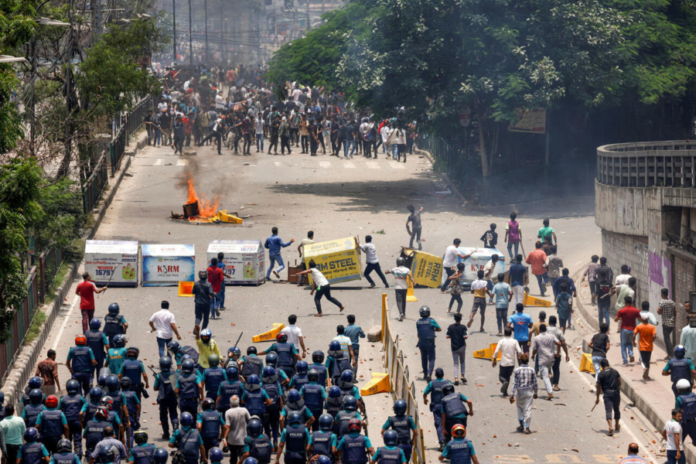Bangladesh and Pakistan have not always had cordial ties. But on Wednesday, November 13, late last week, a cargo ship from Karachi anchored off the southeast coast of Bangladesh, establishing the first direct maritime interaction between the two nations since the Bangladesh Liberation War of 1971.
This action signals a warming of relations under the new interim government headed by Muhammad Yunus, who has now served 100 days in office, and represents a historic change in the complicated relationship between Bangladesh and Pakistan.
Given that India and Bangladesh share a vast border, the action also has security ramifications.
After arriving at the port in Bangladesh last Wednesday, the ship “MV Yuan Xian Fa Zhong” departed shortly after offloading its cargo from Pakistan. The 182-meter-long ship, according to port officials, transported commodities from the United Arab Emirates and Pakistan, including essential food items and raw materials for Bangladesh’s important textile sector.
The Dhaka Tribune said that sodium carbonate, also known as soda ash, which is used in textile and other sectors, was the largest consignment, arriving in 115 containers.
Prior to arriving in Bangladesh, containers from Pakistan had to travel via a third nation.
Syed Ahmed Maroof, Pakistan’s high commissioner, later described the direct shipping route as “a major step” in increasing regional trade. “The initiative will promote new opportunities for businesses on both sides, from small traders to large exporters, and accelerate current trade flows.”
This direct shipment follows the relaxation of import restrictions on Pakistani commodities by the interim government led by Muhammad Yunus in Dhaka. In the past, these items had to undergo a physical inspection upon arrival, which caused significant delays.
“The maritime link is essential for reviving our relations,” the Nobel laureate stated at the time. In order to improve collaboration in several areas, he also advocated for a “new page” in Pakistan-Bangladesh relations.
The ship’s arrival in Bangladesh from Pakistan marks a dramatic change in relations between Dhaka and Islamabad. After the Liberation War, the two nations, which had previously been a one entity, divided in 1971. Up until recently, the horrific conflict, in which millions were killed, was still ingrained in Bangladeshi society.
Bangladesh maintained its distance from Pakistan under Sheikh Hasina’s leadership. However, she continued to draw Bangladesh closer to India. For example, her government refused to let the recently commissioned Chinese naval vessel PNS Taimur to dock at Chittagong Port in August 2022. Following its inaugural cruise and training with the navies of Malaysia and Cambodia, the vessel eventually moored at a port in Sri Lanka.
However, the Bangladesh government led by Muhammad Yunus has adopted a different approach and strengthened ties with Pakistan since Hasina was overthrown and left Dhaka in August.
In addition to the direct maritime route, there are other indications that the two nations are becoming closer. Ironically, Urdu poetry was used at the National Press Club in Dhaka to commemorate the 76th anniversary of Pakistan’s founder Muhammad Ali Jinnah’s passing on September 11. According to reports, attendees hailed Jinnah, with one even stating that “Jinnah is the father of our nation” and that “Bangladesh would not exist” today without Pakistan.
The visa procedure between the two nations has also became easier since Hasina was overthrown. Islamabad declared in September that Bangladeshis would not need a visa to enter the nation.
Bangladesh also placed an order with Pakistan for new artillery ammunition. 40 tons of RDX in wax consistency for explosives and high-intensity projectiles, 2,900 rounds of ammunition, and 40,000 rounds of ammunition were all part of the order. Although this is not the first order of this kind, New Delhi officials have noted that the numbers were significantly higher than normal. An earlier order of 12,000 rounds of ammunition was placed in 2023.
A film that promoted a nuclear pact with Pakistan as a defense against India also went viral. It featured Dr. Shahiduzzaman, a professor of international relations at Dhaka University.
India, the neighboring nation, is concerned about the strengthening of ties between Dhaka and Islamabad.
According to experts, Bangladesh’s decision to do away with the required physical check could make it easier for illegal weapons and drugs to be transported.
According to a former diplomat, India would only be concerned if Pakistan sent “anything objectionable.” He was reported by the South China Morning Post as saying, “You can look at it in a normal way that it is just a trading ship except for the fact that the Bangladeshi government has erased the mandatory checking.” “And the main problem is that Pakistan has a habit of sending weapons and ammunition to different groups in Bangladesh.”
Also Read: Does BRI failure indicate beginning of the fall of China?
India would undoubtedly be worried about the two countries’ expanding connections, Michael Kugelman, director of the Wilson Center’s South Asia Institute, told This Week in Asia. He brought up the 2004 event in which a shipment of weapons intended for the Indian terrorist group ULFA (United Liberation Front of Asom) was stopped in Chittagong, Bangladesh.
India claimed at the time that this shipment was funded by Pakistan. Muhammad Yunus, meantime, has emphasized how crucial it is that Delhi and Dhaka continue to have “very close” ties. “The two nations must have very close relations. This cannot be an alternative. The Bangladeshi daily Prothom Alo cited him as stating, “They need this, we need this.” “This is crucial from every perspective, be it water, security, or economics,” he continued.
Yunus responded that recent events in Bangladesh may have “disheartened” India and “they were not pleased with the changes” when questioned about the recent tensions between the two nations.



